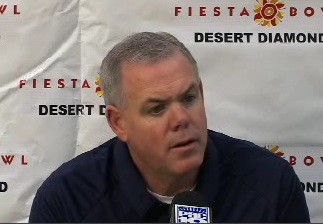Last June it was impossible for Dave Rose to know he would have a men’s basketball team tied for first place in the Mountain West Conference heading into the end of 2009. It was impossible for him to know his team would have the No. 10 Ratings Percentage Index in the nation.
Rose couldn’t fathom, last June, that on the day he turned 52, Dec. 19, his Brigham Young University team would smash Eastern Washington 91-34, marking the largest margin of victory against a Division I team the Cougars have ever experienced.
In June, while he lie a hospital bed for nearly two weeks, Rose was just hoping he would be able to coach again.
“”I can’t imagine what it would be like if I had to come out and say, ‘Hey, I can’t coach anymore,'”” Rose said in McKale Center Sunday afternoon, his hair much grayer than it was when he took the Cougars to the NCAA Tournament the past four seasons.
The BYU head coach had emergency surgery to stop internal bleeding this past summer. Tests done during the surgery showed Rose had pancreatic neuroendocrine tumor cancer. He had his spleen and part of his pancreas removed.
Rose was told he had a 5-in-a-million chance of pulling through cleanly.
According to the American Cancer Society, it is estimated that 42,470 new cases of pancreatic cancer are discovered each year and 35,240 people die from the cancer annually. But because Rose had a rarer form, it was treatable.
He had a scan at the Huntsman Cancer Institute in Salt Lake City, Utah in September, and he was cleared to coach this season.
“”That was kind of a big day,”” Rose said.
Rose will have another scan in March, and then another one six months later.
“”What I went through physically, I think all of us could go through,”” Rose said. “”You can physically get yourself strength and go through those things. … The toughest part was mentally, just not knowing what was next, and trying to stay positive and treat that situation as something that will pass.””
Even though he is 13 games into this season and his team is 12-1, Rose doesn’t feel any pressure for his Cougars to perform. He doesn’t feel much pressure as a coach.
Yes, his lineup may be shuffled year to year due to players leaving to go on religious missions, but he knows they’ll be back. BYU has a recruiting database through 2016-17, and he knows his current team is good.
Rose is thankful just to be coaching—something he wasn’t sure he would be able to do anymore when he was in that hospital bed in June.
“”It’s what I want to do, and hopefully my health will allow me to keep doing it,”” Rose said. “”I never really thought about it before this summer. I just thought I would be able to coach until I didn’t want to coach anymore.
“”Now you just realize,”” he added, “”that this is an opportunity that I’m grateful for.””









